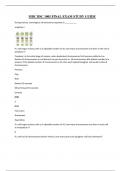Exam (elaborations)
MDC BSC 1005 FINAL EXAM STUDY GUIDE
- Course
- Institution
MDC BSC 1005 FINAL EXAM STUDY GUIDE During meiosis, homologous chromosomes separate at __________. anaphase I If a cell begins meiosis with a 2n (diploid) number of 16, how many chromosomes are there in the cell at prophase I? Prophase I is the initial stage of meiosis, when duplicated ch...
[Show more]



